Coverage: UN Women Executive Director takes “Equality Means Business” to India
Date:
Author: Jeevan Kanakkassery
UN Women Executive Director Phumzile Mlambo-Ngcuka visited India from 18-21 February to meet with gender equality advocates, youth and private sector partners to build momentum towards the upcoming 63rd session of the UN Commission on the Status of Women (11-22 March), and to re-ignite public discourse towards the full implementation of the visionary Beijing Platform for Action.21 February 2019
The final day of the Executive Director’s four-day mission began with an all-staff meeting with colleagues from the UN Women India Multi-Country office (MCO).
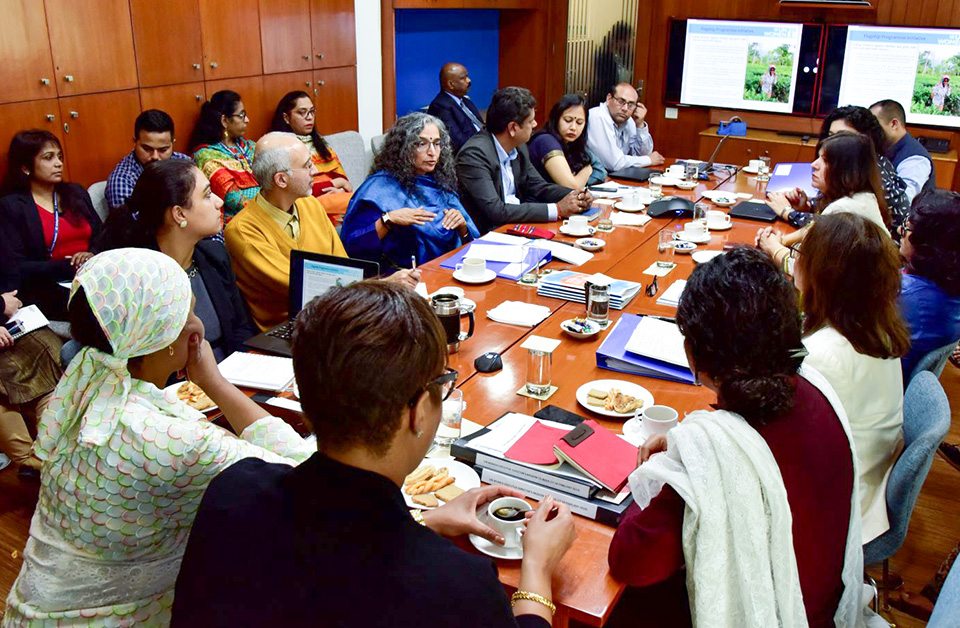
Nishtha Satyam, Deputy Representative for the MCO, led the overview presentation for the region. She briefed the Executive Director on on-going initiatives and key results that were achieved by the office over the past year in India, Bhutan, Maldives and Sri Lanka.
The Executive Director acknowledged the depth of the work by all staff and highlighted the importance of synergies and working comprehensively with government, donors, law enforcement agencies, civil society, the private sector, media and other UN agencies. Stressing the need for systemic changes, the Executive Director also underlined the importance of focusing on interventions that can be scaled-up for wider reach to touch the lives of many more women and girls.
She also expressed her hope that India would send a delegation to New York for the upcoming Commission on Status of Women (CSW), to influence conversations and to bring lessons back.
The meeting concluded with an all-staff photo opportunity with the Executive Director.
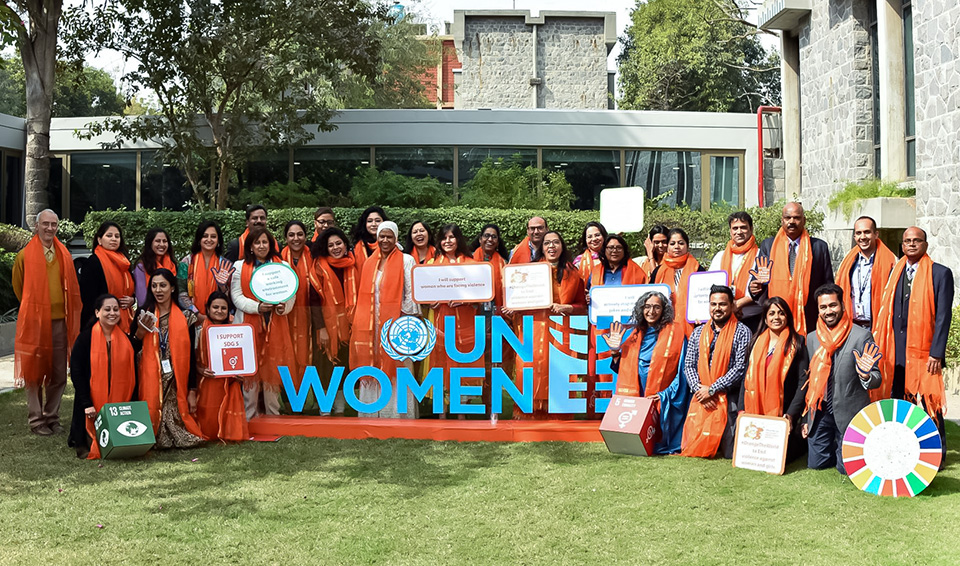
The all-staff meeting was followed by a consultation on ‘Taking Action Towards Transformative Change for Women in the Informal Sector in India’.
The consultation brought together civil society activists and women engaged in the informal sector in India, to understand their challenges and find strategic solutions to accelerate women's economic empowerment in the informal economy.
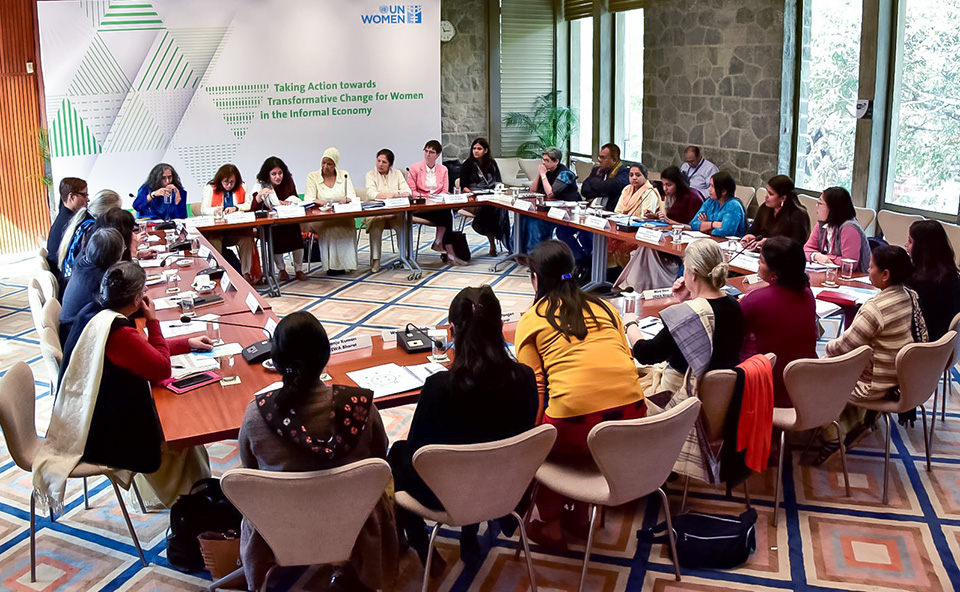
Addressing the participants, the Executive Director said: “India is a critical country for us. The country has the highest number of women working in the informal sector and we need to find means and ways to take action towards transformative change for women in the informal economy.”
She continued: “Globally UN Women has identified women in agriculture and farming as an important sector for us to support, because everywhere in the world, women in agriculture face many issues… women who till the land but have nothing to eat at the end of the day is an indictment of how things are not going the right way.” She referred to this as an issue close to her heart since her activism days.
The Executive Director pointed out that the conversations at the consultation were very relevant as “CSW63 will be looking at social protection systems, access to public services and sustainable infrastructure for gender equality and the empowerment of women and girls across countries.”
During the consultation, policy experts and women representing various occupational groups also shared their perspectives and experiences. The group spoke at length on the challenges they faced, and the demands of women engaged in the informal economy, which included improved social security and enhanced livelihoods, easier access to finance, upgrading of skills, marketing of their goods, and making a strong contribution to inclusive economic growth in an environment free from discrimination and violence.
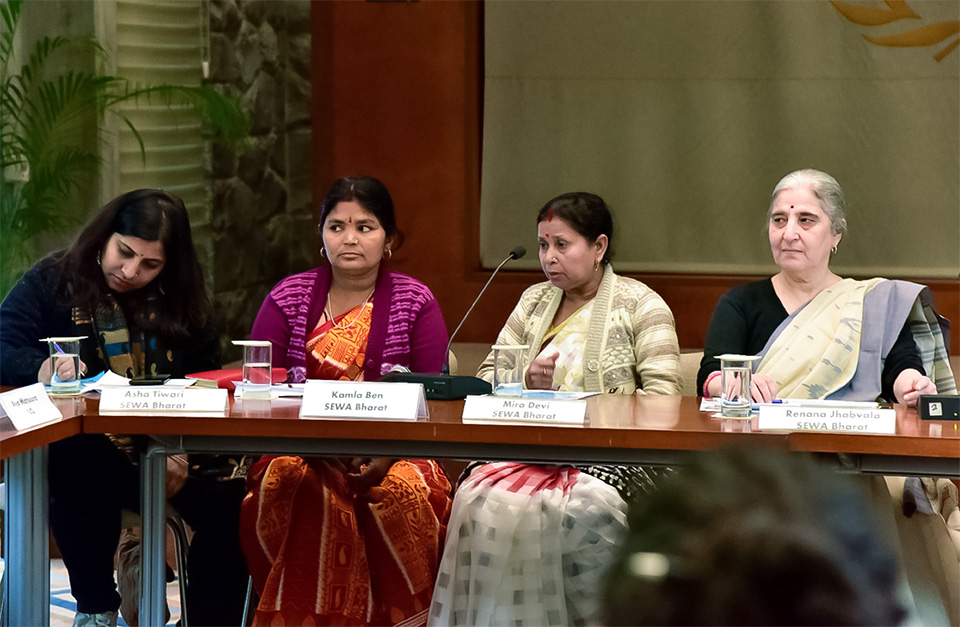
Upon being asked what she wants most, Kamla Ben, a domestic worker from West Bengal, asserted: “Now my sisters (domestic workers) need a law for their protection.”
The consultation was followed by a field visit to a nearby SEWA Centre in New Rajiv Nagar, Delhi. SEWA is one of India’s largest and oldest non-profit organizations with over 2 million active members across 15 states. The SEWA Centre in New Rajiv Nagar has been operational for over 10 years and has trained close to 7,000 women.
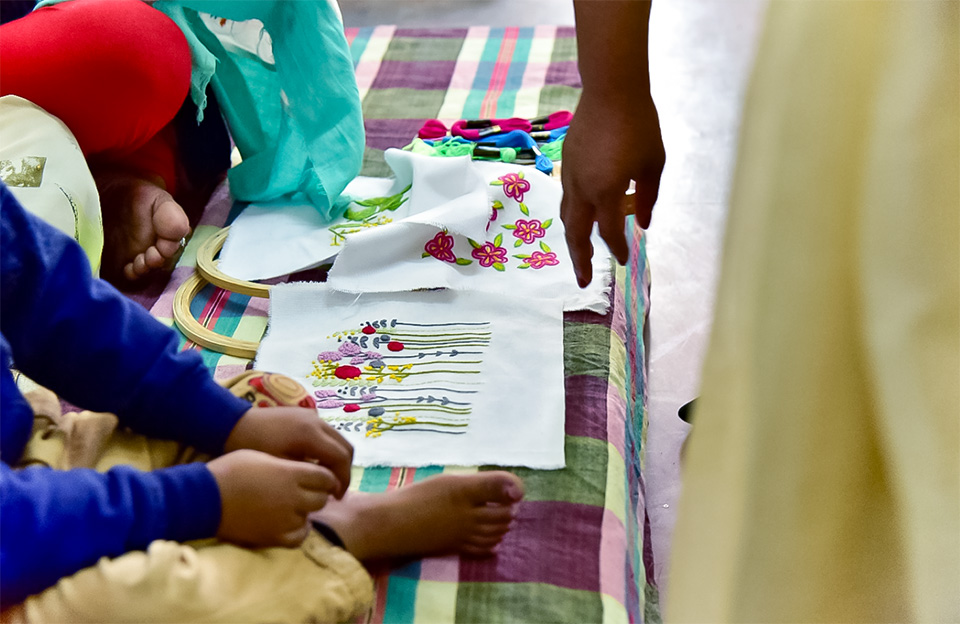
The objective of this visit was to further build on the experiences and learnings of the earlier consultation and inform recommendations to key stakeholders on women workers in the informal sector. The field visit provided the Executive Director an opportunity to directly engage with women home-based workers and reaffirm UN Women’s commitment to create and enabling ecosystem for women in all fields of work.
Both SEWA and UN Women’s programmes with women workers from the informal sector have focused on centre-staging women’s resource rights and capabilities, their voice and agency, and ending all forms of gender-based violence in policy formulation and programme implementation on sustainable livelihoods.
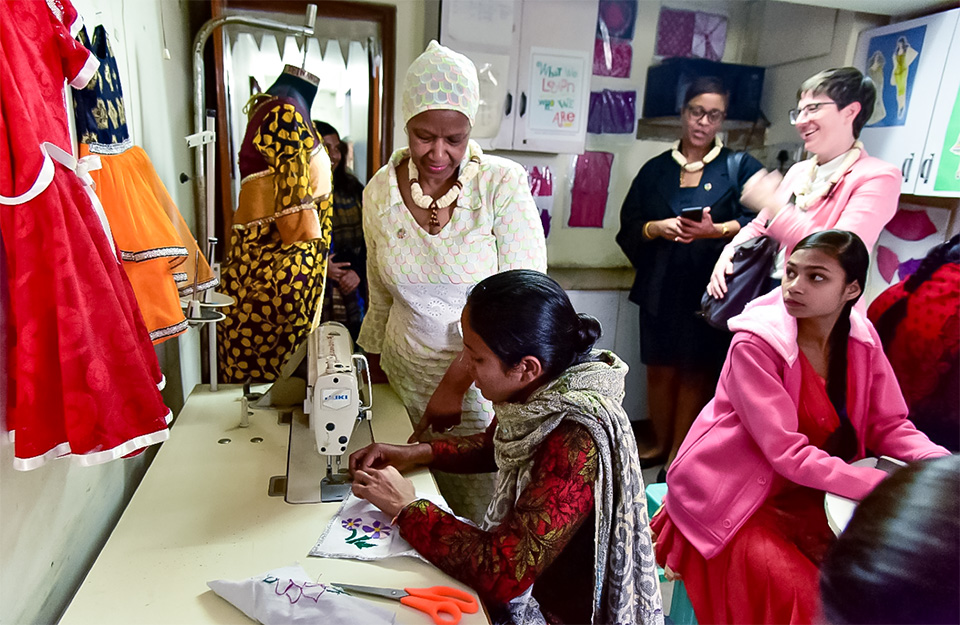
20 February 2019
The third day of the Executive Director’s mission began in New Delhi, the country’s capital, with a meeting with representatives of the UN Country Team (UNCT) in India. The meeting, led by Dr. Yasmin Ali Haque, UN Resident Coordinator a.i. and UNICEF Representative, provided an opportunity for agencies to share their perspectives and an overview of the work on gender being undertaken by the UN system.
The meeting also served as a platform for the Executive Director to emphasize the importance of mainstreaming gender and human rights into the UN’s work in India, and the need for collaboration to implement the India-UN Sustainable Development Framework under the new UN reform process.
Addressing the UNCT, the Executive Director said: “We are very fortunate to be able to work together and collaborate with other UN agencies on gender. We are also keen to mainstream gender across UN Agencies. Given some of the (UN) reforms that are happening, it is pertinent that we are able to coordinate, appreciate and facilitate our joint processes and advocacy efforts. We also have the UN SWAP 2.0, which is why our mandate is also very important.”
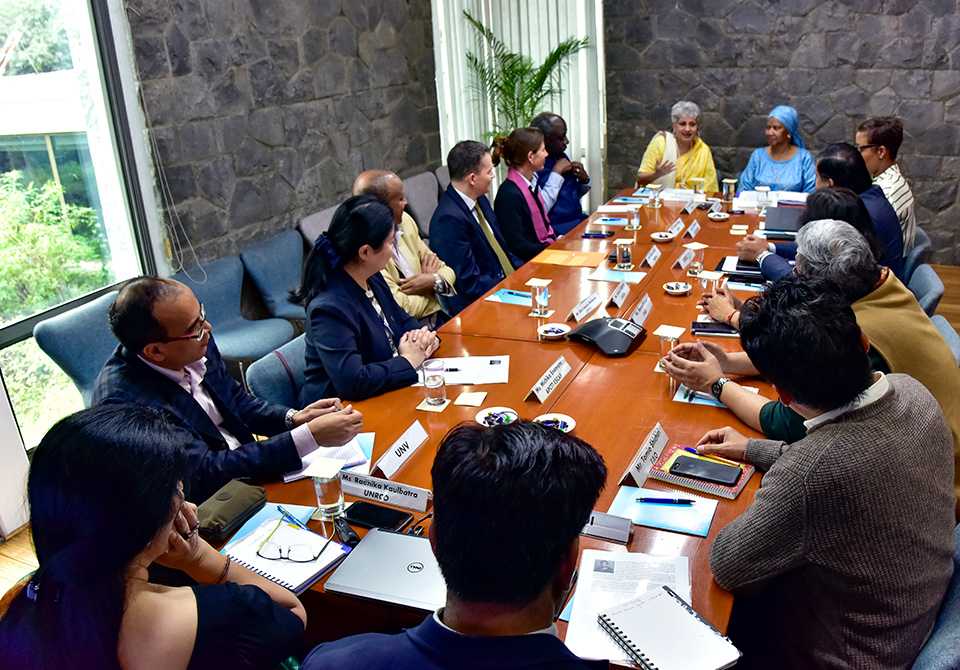
During the meeting, the Executive Director underscored the importance of the UN’s work in India. She said: “India is an important country. While the UN system is not the biggest player, our presence is critical and to be able to provide together and collectively as a system is crucial.”
Purna Sen, UN Women’s Executive Coordinator and Spokesperson on Addressing Sexual Harassment and Other Forms of Discrimination, who was also attending the meeting, said: “We need to constantly review our work, and look at how we go about it. The Secretary-General has been extremely clear on how sexual harassment is contrary to values of the UN system. We must review and strengthen our work against any form of sexual harassment and discrimination.”
Following the UNCT meeting, the Executive Director met with representatives of civil society organizations, media and academia across India for a Consultation on ‘Promoting Gender Equality Through the Beijing Platform for Action (BPfA) and CSW63’.
India played an important role in informing and shaping the BPfA and the global development Agenda 2030. The women’s movement in the country, especially, has been pushing boundaries to realize women’s rights and gender equality. In 1995, over 800 women’s organizations from India participated in the discussions on gender equality and negotiations on strategies for change. The networks that were created since continue to function under the BPfA framework that provided for an inclusive perspective as well as strategies to address critical issues and emerging priorities.
As UN Women will soon mark its 10-year anniversary, the consultation provided the opportunity to take an in-depth look at achievements so far and build momentum on actions needed to accelerate efforts for the empowerment of women and girls. The consultation also aimed at mainstreaming women’s ‘voice, choice and security’ concerns into planning and policymaking processes, including women’s political participation and leadership, ending all forms of gender-based violence, as well as ensuring economic empowerment – especially for the most marginalized women.
The Executive Director, in her opening address, mentioned that when the BPfA was first introduced in 1995 women across the world felt convinced that gender equality would be achieved by 2000. However, “it’s 2019 and we are still nowhere close to it,” she said. She also stressed that this consultation will be a part of the larger mechanism that will try to deliberate on the non-negotiables for gender equality.
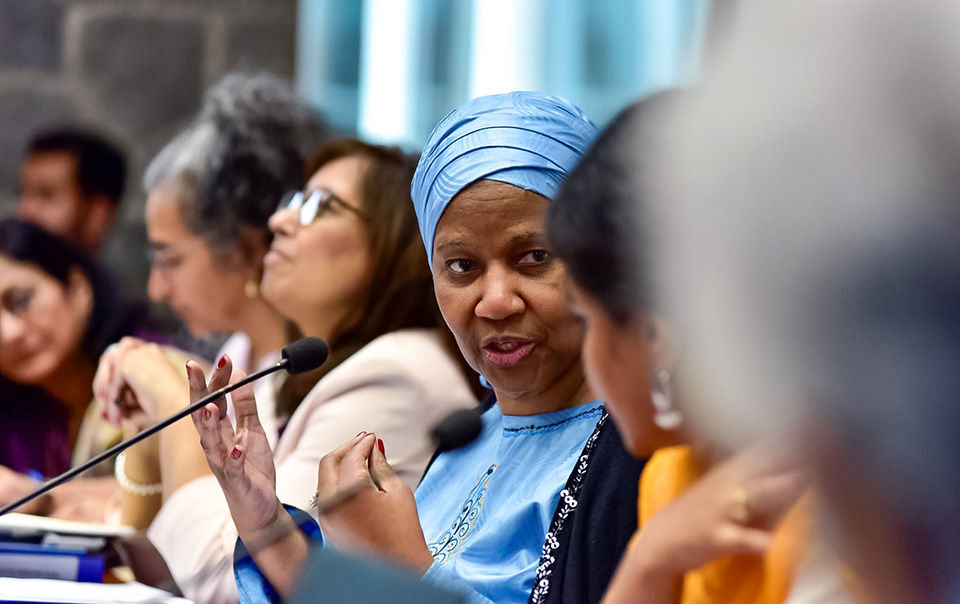
Addressing the participants, the Executive Director said we are “getting closer and closer in defining what substantive equality looks like. In the past few years, we have achieved positive changes – health and education have improved significantly for women and girls in most part of the world.”
However, although more and more girls are getting educated, she continued, “girls armed with qualifications still don’t get the opportunities they deserve.”
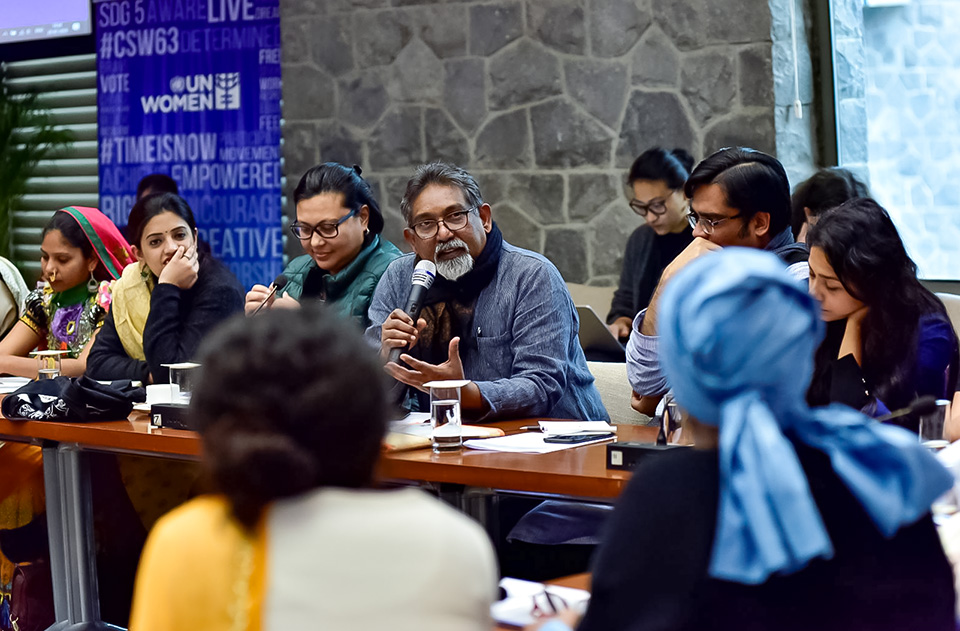
Grass-root women rights holders also shared their concerns and experiences at the consultation. Navlibehen from Gujarat raised the issue of how laws related to women aren’t implemented properly and how coalitions should be used to demand change.
Similar experiences were also shared by Wekoweu (Akole) Tsuhah, who added that, apart from the law of the land, customary practices prevailing in her area further add to challenges that women and girls have to face. She also flagged the issue of acquisition of land for development projects and how the related rules and policies affect men and women differently.
Savita J. Rathor, an Elected Women’s Representative from the State of Gujarat shared that even though there are 33 per cent reserved seats for women in local governance, women from marginalized communities still face ostracization and their decisions also spur violence. Therefore, to enhance women’s political participation, it is very important to “build a supportive ecosystem”.
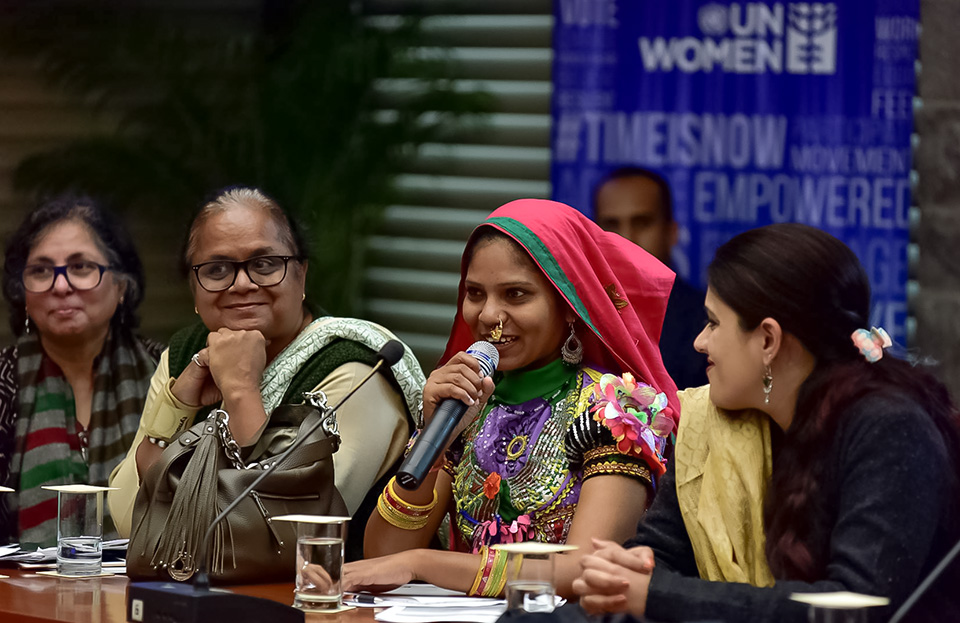
Ladkunwar, a liberated manual scavenger from Madhya Pradesh, shared the challenges of being engaged in manual scavenging, which, although illegal, is still prevalent in India. She said coalitions and campaigns were crucial to challenge the existing system.
19 February 2019
On the second day of her visit to Mumbai, the Executive Director solicited commitments from the private sector to sign on to the Women’s Empowerment Principles, a set of seven principles developed by UN Women and UN Global Compact that guide companies to implement actions to promote gender equality in the workplace, market and community.
The Executive Director met with leaders of the World Bank India, the Small Industries Development Bank of India, and UN Women India’s Business Sector Advisory Council, at the floating of the Women’s Livelihood Bond – conceptualized by the World Bank and UN Women as a simple financial structure that will allow impact investors to invest in women entrepreneurs in India.
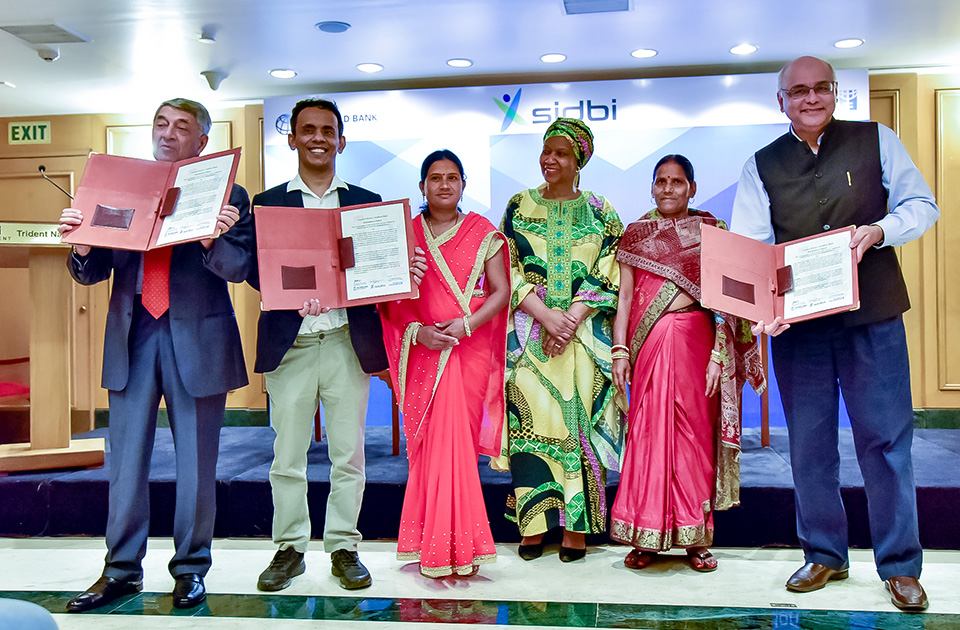
Such an investment will help rural women form Self-Help Groups (SHGs) “graduate” and establish or scale up their individual enterprises. The Women’s Livelihood bond is about moving from women’s livelihood programmes that are financed and supported by development assistance, towards market-financed programmes. It is also about moving from ‘group lending’ (undertaken through SHGs) to ‘individual entrepreneurship’.
Speaking at the event, the Executive Director said: “The private sector is an investor in the women’s agenda, and also helps to enhance the capacity of UN Women.” She added: “UN Women’s Business Sector Advisory Council around the world is a critical partner. We cannot talk about women’s economic empowerment without private sector support. They are key in solving some of the biggest problems we face, many of which are reflected in the SDGs.”
The bonds, which will be raised by SIDBI with the support of the World Bank and UN Women, will be placed with leading wealth managers and corporations in the country on a private placement basis. The rate on these bonds will be three per cent per annum.“Over the next three months, we will be able to raise about Rs 300 crores [USD 42 million] and put it through SIDBI into the micro-finance industry for small and medium women entrepreneurs,” shared World Bank's Country Director Junaid Ahmad.
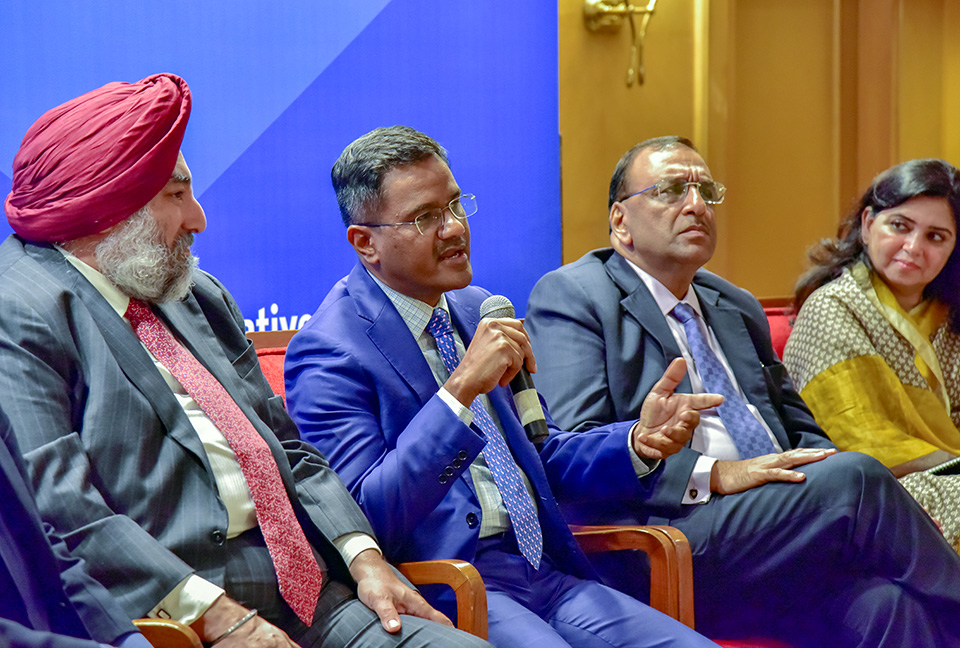
The proceeds from these social impact bonds, which will be unsecured and unlisted, will be used to help rural women in the country’s poorest states to set up or scale up their own enterprises.
The funds will be used for lending to individual women entrepreneurs in sectors such as agriculture, food processing, services and manufacturing. Chair and Managing Director of SIDBI, Mohammad Mustafa said: “We are going to ensure that the credit cost to the women entrepreneurs will not be more than 13 per cent and that the ticket size will be Rs 50,000 [USD 700] to Rs 3 lakh [USD 4,200]." Currently, Micro finance Institutions charge borrowers between 20-24 per cent.
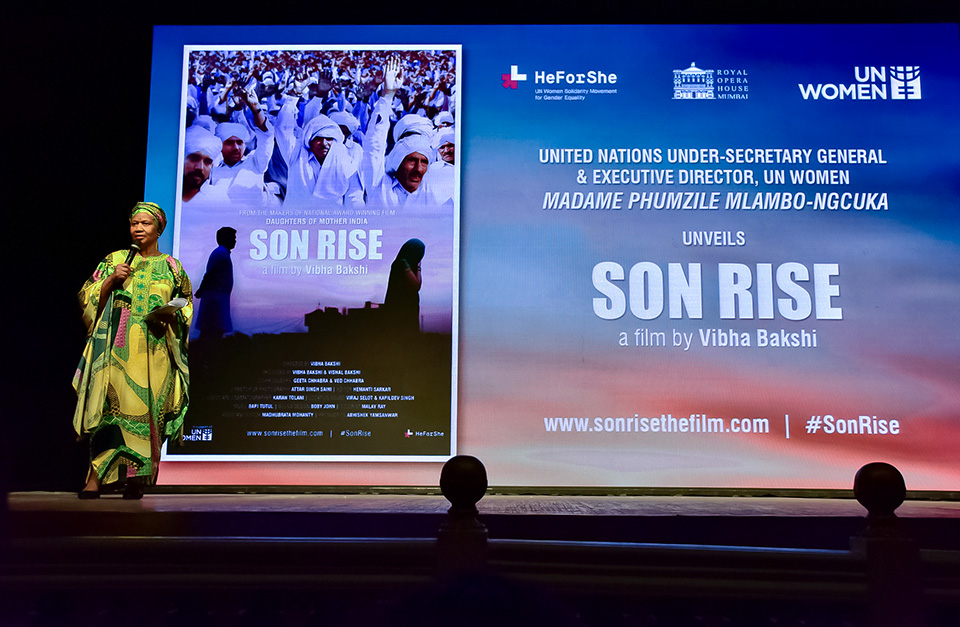
Later in the day, the Executive Director was invited as the guest of honour to the premiere of SON RISE at the Royal Opera House in Mumbai. SON RISE is a documentary set against the backdrop of rural Haryana, India which plays host to a dark underbelly of patriarchy and gender bias. The sex ratio imbalance in the state of Haryana has led to unprecedented levels of gender crimes, from rampant gender-biased sex selection, to bride trafficking, kidnapping and gang rapes.
In this unlikeliest place, the filmmaker, Vibha Bakshi, found ordinary men taking on the ‘extraordinary’ fight to change the narrative on gender inequality. From a forward-thinking Sarpanch (the elected head of a village) fighting for women to enter the male-dominated arena of local-politics, to a farmer who entered an arranged marriage with a gang rape survivor and fights for justice along with his wife.
Opening the premiere, the Executive Director said: “The beautiful thing about the arts is that it reflects our thoughts, it changes our minds, it demonstrates our foolishness, it brings tears to our eyes, but it (also) leaves us with a profound opportunity to reflect.” She said she hoped that the documentary will inspire many, and that UN Women was “proud to be associated with SON RISE”.
18 February 2019
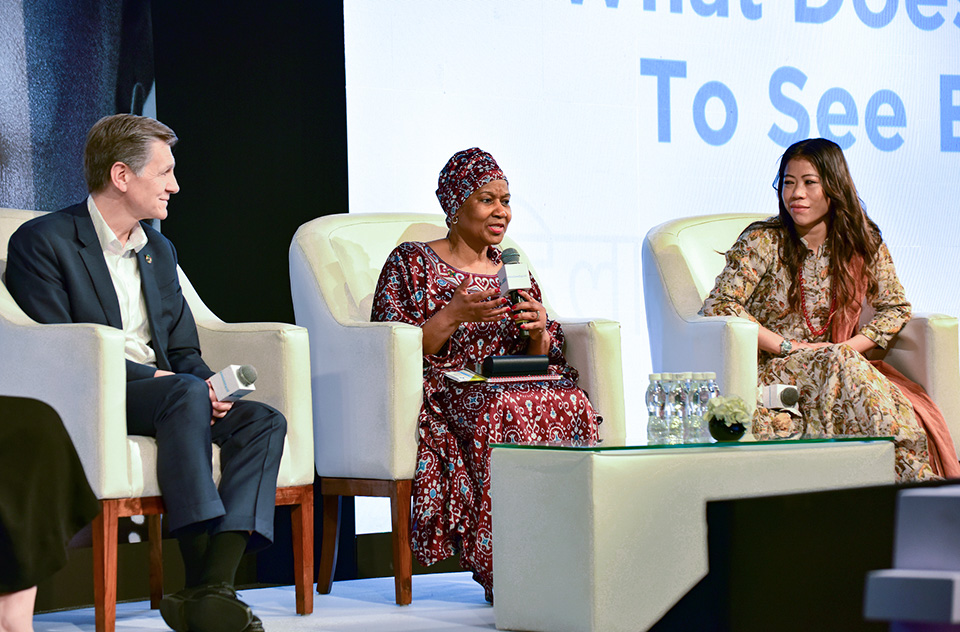
UN Women Executive Director Phumzile Mlambo-Ngcuka attended the #WeSeeEqual Summit in Mumbai, India, a symposium co-hosted by Procter & Gamble (P&G) and UN Women, which brought together nearly 300 leading voices from business, media and civil society to discuss ways to advance gender equality in the workplace, the role of media and advertising in busting the myths that hold women back, as well as the importance of male champions of gender equality.
During the event, P&G announced an investment of USD 100 million in women-owned businesses and to educate more than 23 million adolescent girls on puberty and hygiene across India, Africa and the Middle East.
The Executive Director joined P&G Chief Brand Officer Marc Pritchard and Indian Olympic Boxer and six-time World Champion Mary Kom in a panel entitled: ‘What does it take to see equal?’. The panellists shared their individual journeys and experiences that led them to advocate for gender equality.
They reflected on the importance of gender-equal advertisements, and how they increase brand trust and market share.
Pritchard challenged all – men and women – to work together to build a gender-inclusive world: “Brands affect nearly every person on the planet, every day, and can be agents of change – individually and collectively. We believe one of the best ways to solve the challenges facing us today is for brands to spark conversations that mobilize people to take action.” He also highlighted that gender-equal advertising played a direct role in increasing brand trust and purchasing intent.
The Executive Director said that she was convinced that adverts that presented and projected women in a positive and accurate light is “good for business.” She went on to underscore the importance of creating alliances: “Among other things, UN Women has broadened the partners that we have. Together with P&G and other companies, we have an alliance called the ‘Unstereotype Alliance’, which is an alliance of companies where they use advertisements and their marketing prowess to project women and men much better than they have been.”
Mary Kom also emphasized the importance of working together for women’s empowerment: “We need to join our hands together for gender equality.” Kom stressed the need to provide a supportive environment for women to pursue their passion, even after getting married or having children.
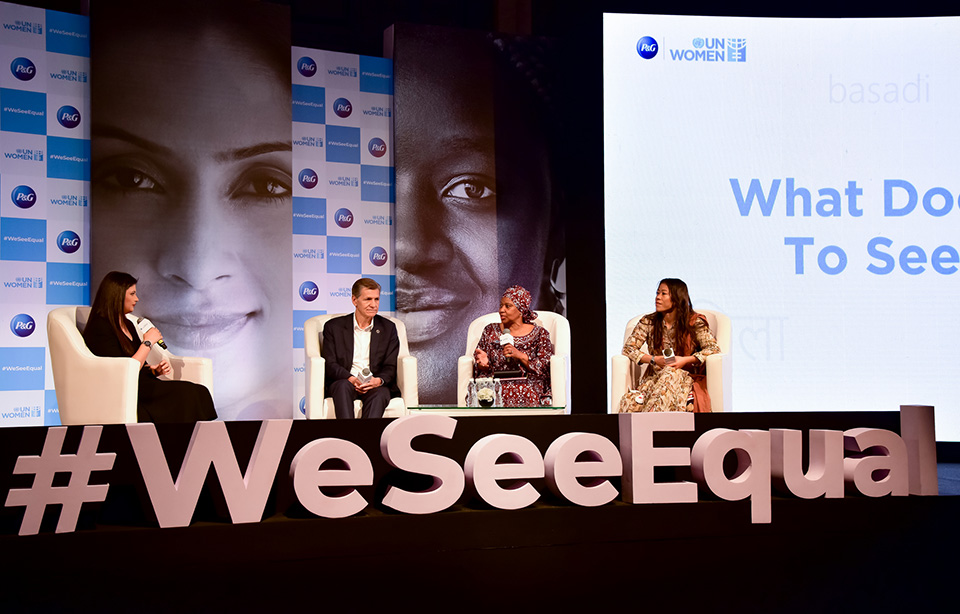
During the panel discussion, there was also a strong focus on infrastructure and how it plays a vital role in the empowerment of women and girls. The Executive Director said that investment in well-coordinated and gender-responsive social protection systems, public services and sustainable infrastructure is essential to support women’s livelihoods, health and well-being, be it childcare services, health and education, or public transport. Such topics will be the focus of this year’s 63rd Commission on the Status of Women from 11-22 March 2019.